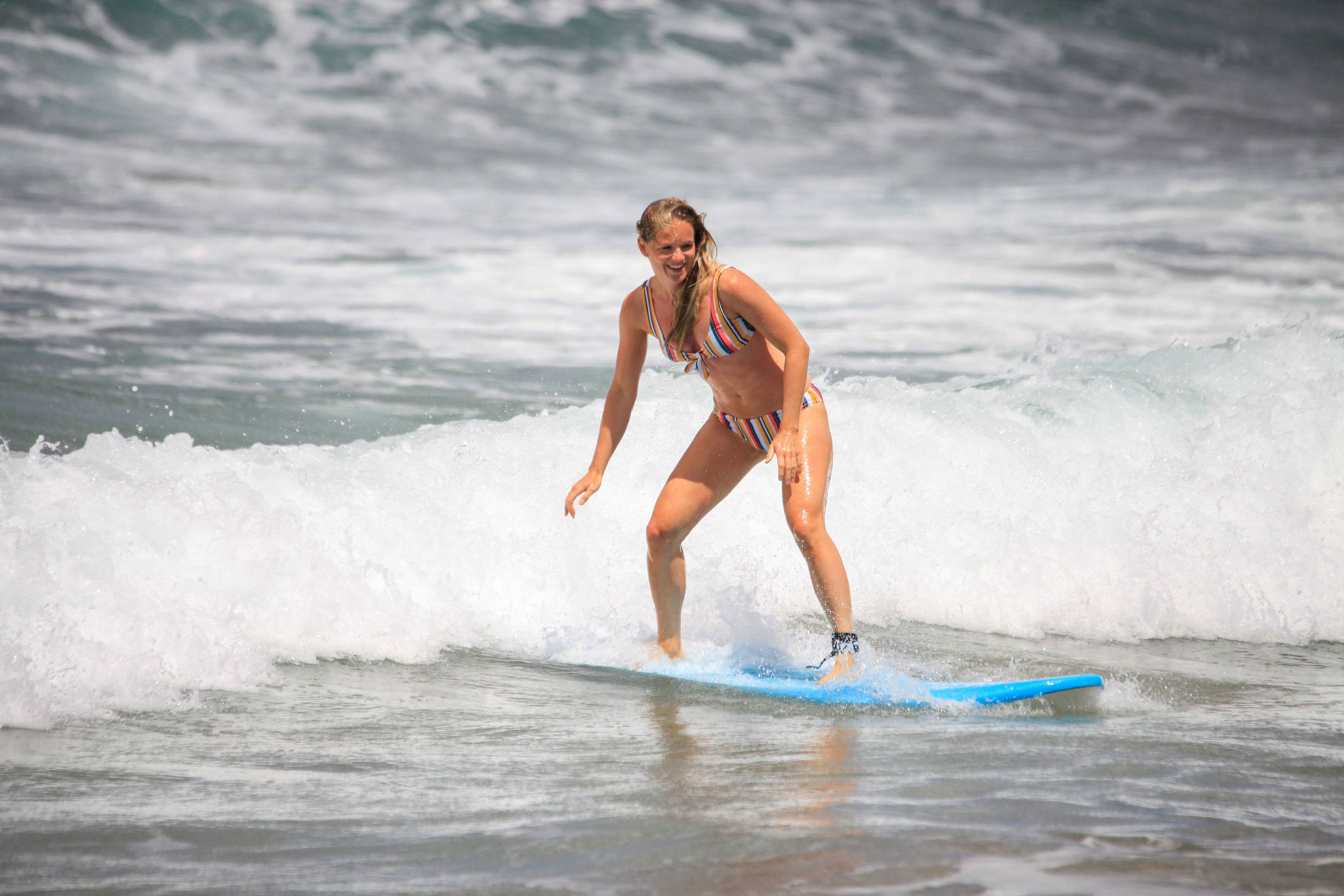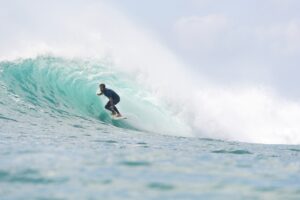How long does it take to learn to surf?

Surfing is an all-encompassing experience. Sitting, waiting and wishing for a wave to emerge from the deep blue is part of this experience and requires patience and experience.
How long does it take to learn to surf? This is the question many novice surfers ask themselves when considering getting started in this epic pastime.
The answer, of course, depends on a number of factors, including previous board sports experience, whether or not you’ve taken surf lessons, and how often you practice.
With that in mind, the only strict rule of thumb when it comes to your time frame for learning to surf is that it varies significantly from person to person. But to give you a rough idea of how long it takes to learn to surf, we’ve put together this handy guide.
Try it if you are thinking about taking surf lessons in Lanzarote or contact us to book a surf session today.
How do I define “surfing”?
To put it bluntly, the time it takes to learn to surf also depends on what you mean by “surfing”.
You may be happy just paddling out on a surfboard, while others define surfing as catching a wave and riding it all the way. Professionals, on the other hand, would say that surfing involves doing tricks on a wave.
For this article, we’re going to break down the different stages of your surfing learning journey and how long it takes you to reach them.
What factors influence my journey to learn to surf?
Before we dive into the different stages of learning to surf and how long it takes to dial them in, it’s important to keep in mind that everyone’s journey will be different.
As we mentioned earlier, several factors can affect your time learning to surf, which include:
- Whether you surf regularly.
- The type of surf lesson you receive.
- Whether you already have experience with board sports.
- How quickly you pick up new concepts.
- How motivated you are to learn.
- The quality of the equipment you are learning on.
- Where you learn to surf (beach break, point break, reef, etc.).
All of these factors can speed up or slow down your journey to becoming a certified surf ninja. Note, however, that fitness level is not listed.
This is because we believe that anyone can learn to surf, regardless of fitness level. And while it certainly helps, the biggest benefit you’ll get from learning to surf is the right attitude combined with a surf lesson (or two).
Can I shorten my surfing learning curve?
Ahhh… you’re already looking for a shortcut, huh?
Well, we don’t blame you. And while we don’t encourage you to take shortcuts, there are some things you can do to make the learning process a little easier and faster. Here are our top tips:
- Choose the right surf school: do a search for a surf school with a good reputation and progressive teaching. Also, make sure the instructors are very experienced and qualified to teach surfing.
- Have realistic expectations: learning to surf takes time and patience. It is important to approach it with the right mindset and not expect to break waves like an experienced surfer on the first try.
- Listen to your instructor: Your instructor will help you progress and give you specific instructions on what to do. It is important that you listen carefully and follow his or her instructions.
- Practice, practice, practice: the more you surf, the better you get. Practice regularly (if possible) and you will see your skills improve over time.
- Stay positive: learning to surf can be frustrating at times, but it’s important to stay positive and have fun – because that’s what surfing is all about!
When can I expect to become a “good” surfer?
Do you look at the more experienced surfers and wonder when you’re going to shred like them?
You’re not the only one.
Of course you want to know how long it takes to surf like the best. But becoming a “good” surfer is a subjective goal. That means you have to ask yourself what your definition of a “good” surfer is.
For many of our students, becoming a “good” surfer means being able to paddle into the lineup, catch waves and ride them to the beach. Others may want to be able to perform more advanced maneuvers like turns and cutbacks. Still others may want to be able to surf big waves with other surfers.
Our advice is to define and visualize your idea of a good surfer. Then, once you have a clear picture in your head, start working towards that goal.
So how long does it take to learn to surf?
As we have described in this article, the journey to learn to surf is different for everyone. We’ve seen people get on their first wave and others take a little longer. No matter what category you fall into, the emphasis should not be on learning quickly. Instead, it should be about learning the basics in a safe environment and progressing at your pace, not someone else’s.
To say this, we’ve put together the following estimates based on decades of teaching people to surf. And while they give you a good indication of how long it takes to learn to surf, remember that these are just estimates.
- Standing on a surfboard – 1 – 2 lessons.
- Picking up a foam board on your own and standing up – 1 – 3 lessons
- Paddling out the back, catching a wave and surfing it all the way – 3 – 5 lessons
- Surf a lineup, catch a wave without breaking and surf it all the way – 5 Lessons +
- Surf with confidence – 10 lessons +
That’s it!
If you want to become a confident surfer, catch more waves and learn the rules of surfing, it’s best to book a surf lesson. This ensures that your surfing progress is accelerated. And with a little luck, you’ll be catching waves, diving and joining your fellow surfers in the world’s best pastime in no time!
Book a surf lesson at Lanzasurf today!





